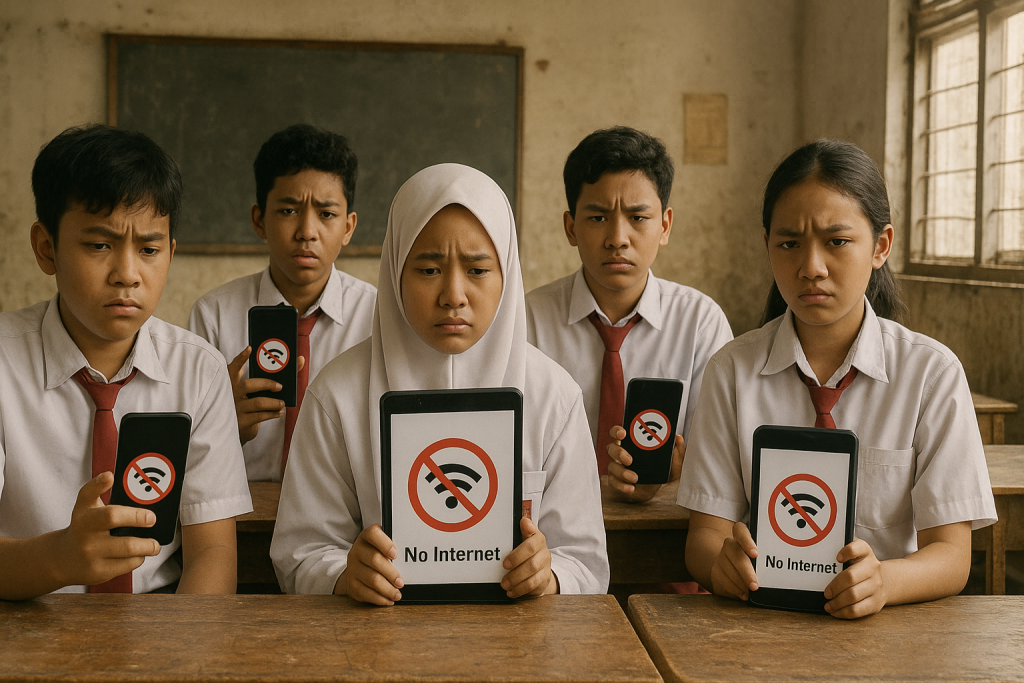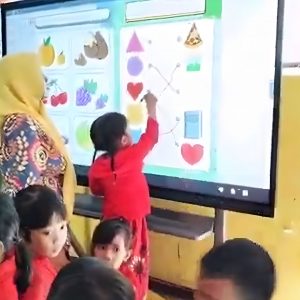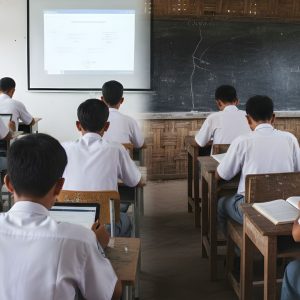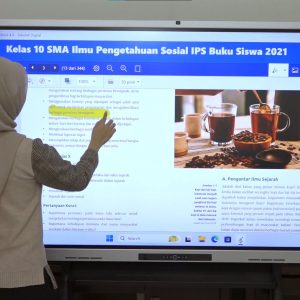
If you search anywhere — on Google, ChatGPT, or other platforms — for the biggest challenge in Indonesia’s education system, you’ll almost always find the same answer: digital infrastructure.
The internet simply isn’t available in many rural areas, and outside of big cities, when it does exist, it’s often painfully slow and too expensive for most students to afford.
In the largest archipelago in the world — with over 17,000 islands — this is not a problem that will disappear anytime soon. The internet will never be equally available across all regions, not in the next five years, and perhaps not even in the next few decades.
The Cost of Waiting
Indonesia’s K–12 education is already far behind other countries, as shown in the latest PISA scores. Without access to digital learning, students in rural areas are at an even greater disadvantage in subjects like science, AI, coding, and mathematics.
The reality is harsh: the country cannot change its geography, it cannot magically increase household buying power, and it may take decades before infrastructure catches up. By then, our students will be even further behind in the global race for knowledge and skills.
Waiting for the internet to reach every corner of Indonesia is like waiting for a train that will never arrive. Internet companies have little incentive to invest in remote islands, mountainous regions, or rural areas with low purchasing power.
A Solution That Works Today
This is why Indonesia must focus on solutions that work now — solutions that don’t require perfect internet coverage or expensive connectivity. Government involvement is critical, but governments are not technology developers, and bureaucratic change often moves slowly, shifting direction every time leadership changes.
This is where Kipin EdTech steps in.
For over a decade, Kipin EdTech has built a platform tailored for Indonesian schools — one that brings quality educational content to every corner of the country, including 3T areas (Frontier, Outermost, and Disadvantaged regions). The key? Kipin Classroom — an intelligent local server that can fully digitalize a school without requiring an internet connection.
How Kipin Works
Kipin’s exclusive EduSpot technology uses a local WiFi network to connect every student’s and teacher’s device to a central server, delivering an online-like experience entirely offline. Students gain valuable digital literacy skills and access to rich educational resources without ever touching the internet.
One popular feature is Download & Go — students can take digital books, videos, and learning materials home to study, even if they have no internet at home. Teachers also benefit from the Local Upload feature, which allows them to instantly share materials with students digitally and securely within the school network.
In 2025, Kipin Classroom contains more than 7,000 books — far more than in its 2023 edition — making it a ready-to-use digital library for schools across the nation. Even better, all content students download is free of charge.
Smarter Assessments
Kipin also offers Kipin PTO (Paperless Test Organizer), a digital assessment system that allows teachers to conduct exams and quizzes without printing paper. It automatically grades tests, saving teachers hours of work, and works entirely offline through Kipin EduSpot.
Proven, Award-Winning Impact
Kipin is unlike any other EdTech solution in Indonesia. It has won numerous awards, including the WSA Awards, GES Awards, TIME Magazine Award, and Temasek Foundation Awards.
Santoso Suratso, CEO of Kipin, puts it simply:
“Our commitment to democratize education in Indonesia has been blessed because we look at solutions locally. We know what local schools need, and with over 300,000 schools to serve, the mission is huge — but possible.”
In a country where the internet will never be the equalizer, Kipin has proven that the right technology, designed for local challenges, can bridge the education gap today — not decades from now.
Contact Us:
Web : kipin.id
Email : info@kipin.id
WA Chat : wa.me/6281233601047






